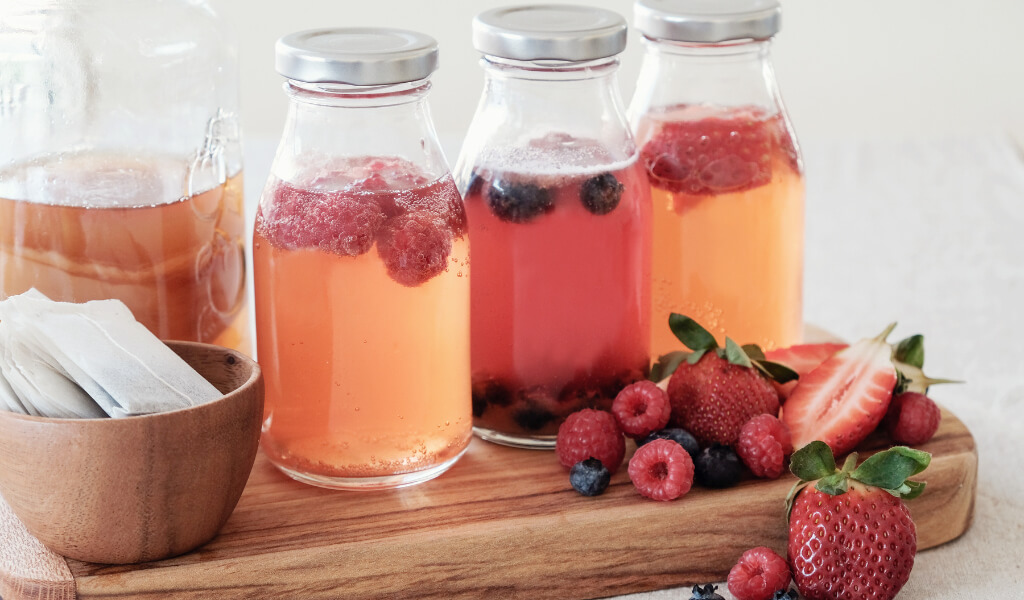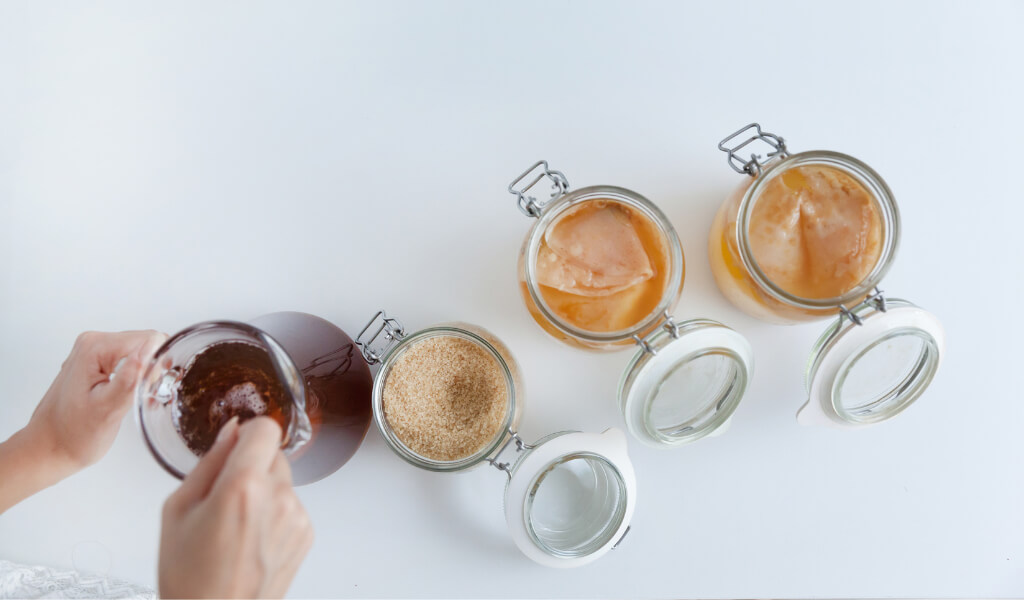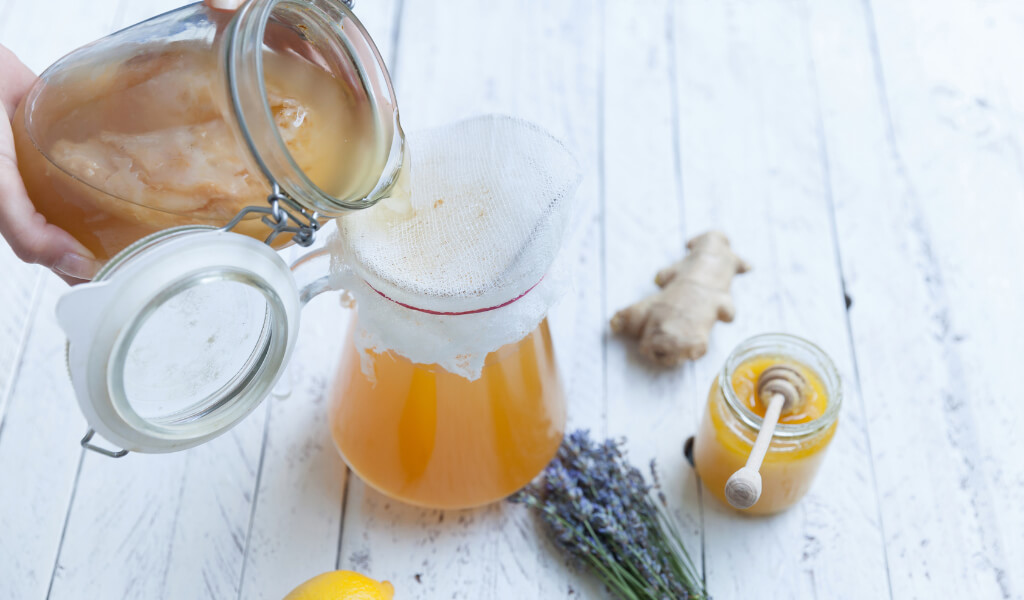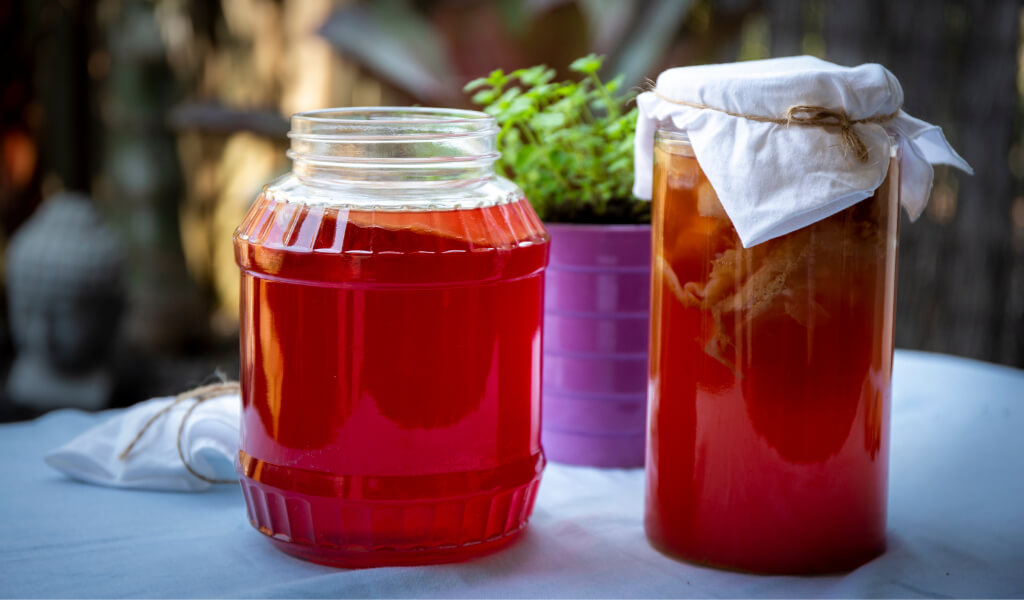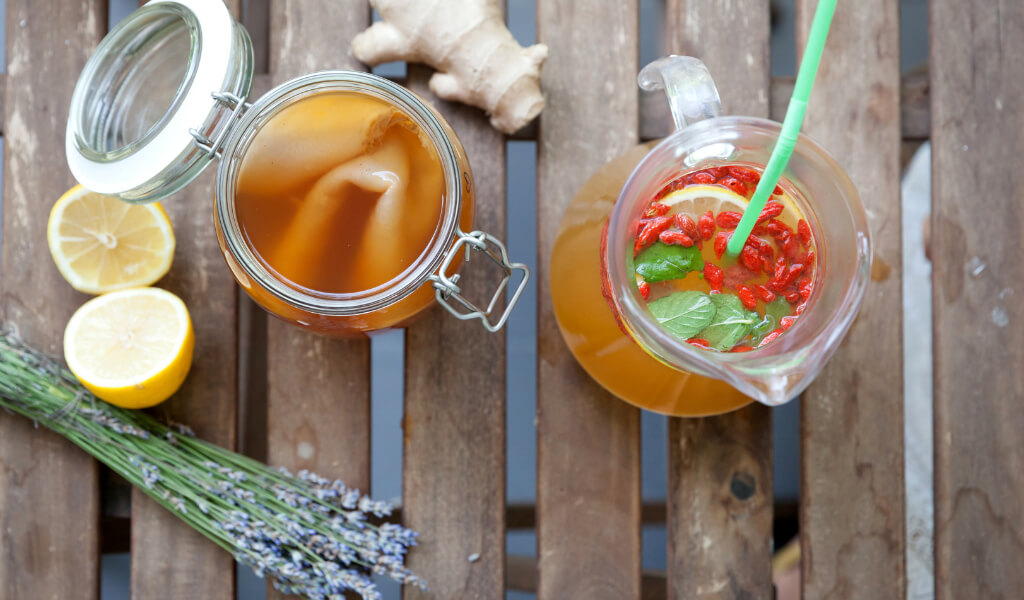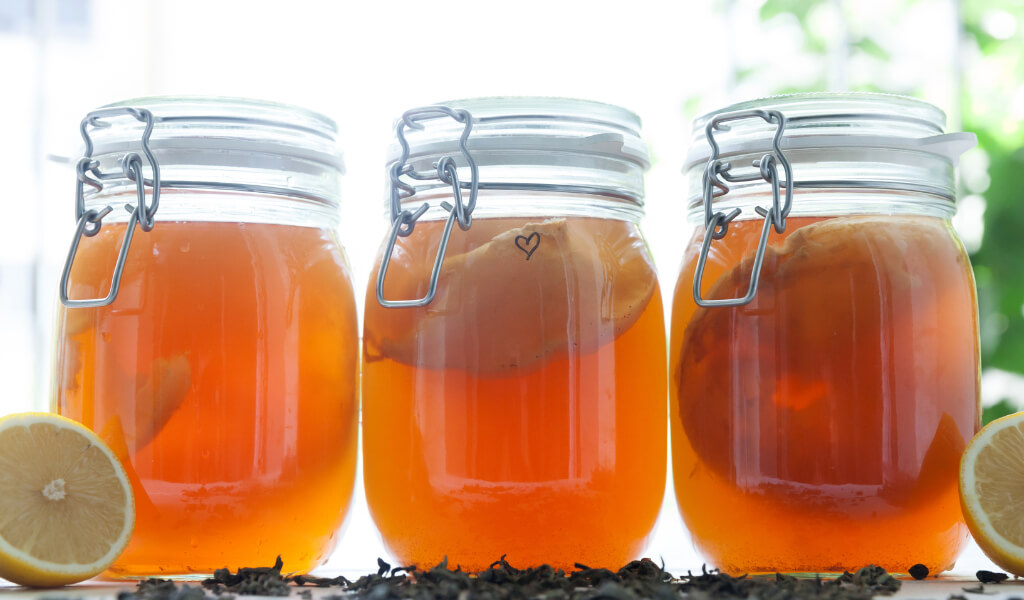What is Kombucha?
The Kombucha Culture, frequently and commonly referred to as a mushroom, is a symbiotic colony of yeast and bacteria or “scoby” for short, but this is the GOOD kind of bacteria and yeast that most people today are sadly lacking.
Kombucha Mushroom Tea is made by combining the culture, with a mixture of black or green tea, and sugar.
The ingredients are allowed to “ferment”, usually from 7-10 days.
The resulting beverage contains dozens of elements, many of which are known to promote healing for a variety of conditions.
Traditionally, Kombucha use has spread (for over 2000 years) by the passing of Kombucha Cultures from family to family, and amongst friends. This Scoby has been a large part of Russian culture as well as Chinese and Egyptian for literally 1000′s of years, but I”m sure there are many other cultures with a long radiant history of vibrant health.
We today in the modern world are so frequently deprived of these basic and essential living nutrients and many of us are eating dead food that has little or no nutritional value.
Your diet is essential to attaining vibrant health in this lifetime.
The culture of Kombucha is built on developing and improving ones health as well as building up your defenses to keep you that way.
To say that these microbiotics are essential for your good health is an understatement. It is said that the average person’s stomach in the western world today is completely OUT of live enzymes by the age of 30.
This is a major concern. Take steps to remedy this situation, whether it’s Kombucha or sauerkraut, or miso soup or alternate them to suit your taste.
The important thing is do SOMETHING to improve the quality of your “gut flora” before you are facing serious ailments as a result.
What’s in Kombucha?
We all know it’s healthy, but what’s in this stuff exactly? Turns out, there’s a lot of really interesting stuff in Kombucha tea. It seems the ancient ones were way ahead of their time.
Organic Acids
As the Kombucha culture digests the sugar it produces a range of organic acids like glucuronic acid, gluconic acid, lactic acid, acetic acid, butyric acid, malic acid and usnic acid; vitamins, particularly B vitamins and vitamin C; as well as amino acids, enzymes. And of course there are all the benefits of the probiotic micro-organisms themselves. The Kombucha culture is a biochemical powerhouse in your kitchen.
Glucuronic Acid
The body’s most important detoxifier. When toxins enter the liver this acid binds them to it and flushes them out through the kidneys. Once bound by glucuronic acid toxins cannot escape. A product of the oxidation process of glucose, glucuronic acid is one of the more significant constituents of Kombucha. As a detoxifying agent it’s one of the few agents that can cope with pollution from the products of the petroleum industry, including all the plastics, herbicides, pesticides and resins. It kidnaps the phenols in the liver, which are then eliminated easily by the kidneys. Kombucha can be very helpful for allergy sufferers. Another by-product of glucuronic acid are the glucosamines, the structures associated with cartilage, collagen and the fluids which lubricate the joints. It is this function that makes Kombucha so effective against arthritis.
Lactic Acid
Essential for the digestive system. Assist blood circulation, helps prevent bowel decay and constipation. Aids in balancing acids and alkaline in the body and believed to help in the prevention of cancer by helping to regulate blood pH levels.
Acetic Acid
A powerful preservative and it inhibits harmful bacteria.
Usnic Acid
A natural antibiotic that can be effective against many viruses.
Oxalic Acid
An effective preservative and encourages the inter-cellular production of energy.
Malic Acid
Helps detoxify the liver.
Gluconic Acid
Produced by the bacteria, it can break down to caprylic acid is of great benefit to sufferers of candidiasis and other yeast infections such as thrush.
Butyric Acid
Produced by the yeast, protects human cellular membranes and combined with Gluconic acid strengthens the walls of the gut to combat yeast infections like candida.
Hyaluronic Acid
Woman pay top dollar in skin care products that include this and it is produced naturally in the kombucha process. Many of these types of products are of course, useless. Not the kombucha!
How To Make Kombucha
USE DISTILLED WATER ONLY!
Do NOT use: tap, filtered, spring, purified, reverse osmosis, or well water under ANY circumstances.
1. Boil Water
Do not over boil. Over boiling reduces the oxygen and carbon dioxide needed for fermenting kombucha.
The purpose is to heat the water sufficiently to extract the tea and dissolve the sugar.
2. Add Sugar
Do not boil longer than 5 minutes. Longer may “caramelize” the sugar. Most any sugar is OK to use.
( 1 cup per gallon ) I have been wanting to try Coconut Sugar, but havn’t tried it yet.
Pure Cane Sugar works just fine. The culture will consume most if not all the sugar in a week or 2.
3. Add Tea
Steep for no longer than 10 minutes and remove t-bags.
Caffeinated Green, Black or White Tea. ( 3 -4 bags per gallon )
The organic teas are more likely to mold , although the chances are slim, on your first batch you should play it safe.
Use NON-organic teas, and you will not experience any mold problems .
Later, when you have plenty of cultures to experiment, you can do some organic teas and see how it goes.
4 . Cool to Room Temperature
Make sure that the tea is NOT hot before proceeding to step 5 !!!
5. Transfer into a Glass Container
6. Add the Kombucha Culture and Starter Tea
Place the “mother” kombucha in the tea.Use the liquid from your previous kombucha brew for next round ,
this is added to kick start the fermentation process and to prevent mold !
So remember, to save some of your first batch as your “starter tea” (ie: don’t drink it all)
The kombucha will grow to fit any size container.
The “mother” may float, sink or go on its side; No Problem.
7. Cover with Cloth
One that is tight knit, coffee paper filters, paper towels, & fresh linen are often used
depending on the size of the container various covers are options.The purpose is to prevent pathogens and or insects from contaminating the brew.
8. Leave Undisturbed
Typical frementation is 9 days at 79F (26C) or 14 days at 74F (23.5C).
Some prefer their kombucha sweeter with a 6-8 day ferment.
Taste your brew as you go to control the sugar consumption.
Your culture is feeding on sugar and caffeine so the longer you brew the less sugar is present in the tea.
9. Strain and Drink / Or click here to learn how to add fizz and or flavor !
Refrigeration will slow the fermentation process by 90% so when its to your liking, put it in the fridge.
10. Separate the New Culture (baby) from the Mother
Now you have 2 cultures that can each make a new batch. Don’t forget to save some starter tea, you will need it for your next batch .
You can wash the Kombucha in cooled, distilled water to remove any darker strings that often grow.
Leave the Kombucha on a clean dish with a little of its brew while you clean the container.
Always keep a back up Kombucha in case your main organism is damaged in any way.
You can store a Kombucha in the freezer for months.
Get into the habit of replacing your back up with a new one each year.
Although we do recommend brewing in a large bowl for your drinking supply, a glass jar is also excellent in our opinion.
Kombucha Health Benefits
Many health claims are made for Kombucha Mushroom Tea even though it has not been completely researched, it has certainly been shown to have beneficial antibiotic, antiviral and anti fungal properties in lab tests. There is a lot of experiential evidence from people who have been using kombucha tea over many years. Many of the benefits reported include improvements in energy levels, metabolic disorders, allergies, cancer, digestive problems, hypertension, HIV, chronic fatigue and arthritis. It‘s also used externally for skin problems and as a hair wash among other things.
- Balances pH in the body to promote a healthy immune system.
- Prevents certain types of cancer.
- During menopause, reduces hot-flash discomforts.
- Helps Constipation.
- Helps bronchitis, asthma, cough in two or three days. Will help children with plegm.
- Helps detoxify kidneys.
- It has proven useful in in cataracts and other formations on the cornea.
- Helps with allergies, also with aching nerves.
- It cleanses the gall bladder, helps colitis and nervous stomachs.
- Helps heal diseases. It will lower cholesterol and soften veins and arteries.
- Helps digestion.
- It will stop infectious diarrhea.
- Helps burning of fat, therefore, helps to lose weight.
- Helps the liver work more efficiently.
- Helps to level off glucose and sudden drops in blood sugar in diabetics. If taken daily, it will eliminate urea in 100 days.
- It has surprising effects on the scalp, helps avoid balding, thickens hair and eliminates gray hair.
- Helps Insomnia.
- It has proven useful in in cataracts and other formations on the cornea.
- Helps muscular aches and pains in shoulders and neck.
- Helps with allergies, also with aching nerves.
- Eliminates wrinkles and helps the removal of brown spots on hands.
Note: As with any cleansing process, your body may undergo conditions which would require appropriate but simple care.
Disclaimer
The FDA has not investigated nor does it support any health claims for Kombucha Tea. In accordance with FDA regulations we do not make any health claims for Kombucha tea. All health information is strictly for informational purposes. Please see a Physician for any health concerns or questions. Kombucha tea should be enjoyed as a food.
Weight Loss & Digestion
How Kombucha Tea works with your body
Balancing your body’s PH level and aiding in digestion and weight loss.
Kombucha works by altering the pH of the large and small intestine to a slightly more acidic level.
Scientifically, The bacteria causing acid reflux indigestion and gas also known as ” putrefactive ” tends to be inhibited or destroyed.
Kombucha is not a cure-all or a magical drink but it helps with digestion and energy. It’s just another fermented product to add to your diet in moderation along with other fermented foods. Especially beneficial for weight loss and general vibrant health.
As a probiotic, kombucha aids in the breakdown and digestion of food, preventing acid reflux and relieving constipation…the good bacteria and yeast present in the Kombucha Tea reduce bad bacteria and parasites in the intestines which are strongly present in those with a heavy red meat and fatty diet.
Kombucha contains probiotics, friendly yeasts and bacteria that act as a natural detox removing toxins from the body. As your digestion improves and your body balances its PH level, you’ll have fewer cravings for junk food as well as having more energy.More energy means more exercise. and as we know more exercise equals weight loss and physical fitness.
Amino acids
Protein building blocks include leucine, lysine, methionine, phenylalanine, threonine, and valine. Which are not made in the body and must be derived from your food source.
Enzymes
The enzymes invertase and lactase are found in kombucha. Enzymes promote chemical and metabolic processes in the body. Lactase is necessary for digesting lactose, the sugar found in milk products. Invertase helps digest sugar sucrose.
Minerals
Yeasts in kombucha contains a number of minerals, including chromium, potassium, sulfur, iron, and phosphorus.
Cellulose
A certain amount of cellulose makes its way into the tea. Cellulose is an insoluble fiber that improves digestive function and helps prevent constipation and colon cancer.
Other nutrients
Lecithin helps break down fats in the body and also protects the myelin sheath which surround nerves. Vitamin C or ascorbic acid is also produced by the bacteria in kombucha, vitamin C is a natural antioxidant and immune booster.
Thus making kombucha tea a natural powerhouse in the efforts of Digestion Aid and Weight Loss.
Add Kombucha tea to your diet and start seeing results immediately.
Detoxification
Kombucha and Cellular Reconstruction
Investigations into the action of Kombucha on the cellular metabolism of plants may also have implications for human cellular reconstruction.
Research indicates that daily amounts of glucuronic acid optimizes the natural processes of growth and decomposition at a cellular level by eliminating toxins from the organism.
There is evidence that this contributes to a general strengthening of the cell walls and an improvement of cellular metabolism which strengthens the whole system.
Vitamin Content and Recovery from Illness
Heavy Metals Excreted as People Drink Kombucha
When examining body fluids such as urine, it has been shown that people who drink Kombucha on a regular basis will expel toxins that have either built up internally as a result of illness or that have been absorbed from the environmental.
Toxins which have been successfully isolated as being effectively purged
from the body are: cesium, mercury, lead and benzol.
Kombucha’s most notable effect on the human body is Detoxification.
This is mainly due to the glucuronic acid component.
Various toxins either from consumption or from environmental sources are absorbed through the lungs, stomach or skin combine with the glucuronic acid to form complex molecules which are then voided through the intestines or bladder.
Compounds of glucuronic acid may be found within vital complex polysaccharides such as mucoitin-sulfuric acid which is present in gastric mucous membranes and the vitreous humor of the eye, chondroitin sulfate within cartilage, and finally in the connective tissues as hyaluronic acid.
Balancing Your Body’s PH & Kombucha
Better Understanding PH Acidity And Alkalinity of the Body pH (potential of hydrogen) is a measure of the acidity or alkalinity of a solution.
It is measured on a scale of 0 to 14—the lower the pH the more acidic the solution, the higher the pH the more alkaline (or base) the solution.
When a solution is neither acid nor alkaline it has a pH of 7 which is neutral.
Why Should I Maintain a Balanced P.H Level?
An unbalanced pH level in the body can become a dangerous condition that weakens all body systems making your body prone to disease, as opposed to a pH balanced environment which allows healthy body function necessary for the body to resist disease.
A healthy body maintains a proper alkaline reserve to meet emergency demands.
When excess acids must be neutralized our alkaline reserves are depleted leaving the body in a weakened condition.
A pH balanced diet, according to many experts, is a vital key to health maintenance.
What is a Healthy P.H level?
An ideal pH level is between 6.5 to 7.5 on a scale of 1-14.
In the pH balance of the body it has been found that healthy humans who are free of cancer usually have a pH balance which is less than 7.5.
People suffering from cancer usually have a pH higher than 7.55 kombucha will cause the blood pH to fall by increasing its acidity.
The pH of kombucha at about 7 days is roughly 3.0 depending on the temperature in which kombucha was brewed.
The warmer your kombucha, the quicker it ferments, not to exceed 85 degrees.
Symptoms of an Unbalanced PH level
An Unbalanced pH level can be at the cause of many common symptoms:
Constipation, heartburn, headaches, weak immune system resulting in frequent illness, digestive problems, acne, fatigue, and sleeplessness, excess weight.
Serious risks include
High blood pressure, high cholesterol, osteoporosis, cancer, cardiovascular and heart disease, kidney stones, arthritis, diabetes and obesity.
Having a balanced pH level is critical for disease prevention, healing, and detoxification.
Kombucha contains pro-bio-tics, yeasts and bacteria that remove toxins from the body. As your digestion improves your body balances its PH level.
What Causes Me to be Acidic?
Acidosis is more common in our society and is directly linked to our diet
as well as the accumulation of chemical and heavy metal toxins due to environment.
Drinking kombucha improves digestion and your body balances its PH level.
Frequently Asked Questions
Does kombucha have caffeine?
Yes, kombucha typically contains a small amount of caffeine due to the tea used in its fermentation process. The caffeine content can vary depending on the type of tea used and the brewing time, but it is generally lower than a cup of brewed tea or coffee.
Does kombucha have alcohol?
Yes, kombucha does contain alcohol, but it’s usually less than 0.5% alcohol by volume as a natural byproduct of the fermentation process. This low alcohol content is not enough to cause intoxication and is similar to the alcohol content found in many non-alcoholic beverages.
What is kombucha made of?
Kombucha is made from sweetened tea that undergoes fermentation with the help of a symbiotic culture of bacteria and yeast (SCOBY). The SCOBY transforms the sugar and tea into a fizzy, tangy beverage through the fermentation process, resulting in the characteristic taste and carbonation of kombucha.
What does kombucha taste like?
Kombucha has a slightly tart and effervescent flavor profile with varying degrees of sweetness, acidity, and hints of tea, depending on the flavorings and fermentation process. The taste can range from mildly sweet and fruity to more sour and vinegar-like, depending on factors such as the ingredients used and the fermentation duration.
How Much Alcohol Is in Kombucha?
Kombucha typically contains less than 0.5% alcohol by volume (ABV). This low alcohol content is a natural byproduct of the fermentation process and is generally considered non-alcoholic. However, it’s essential to note that alcohol levels can vary among brands and batches.
Why Is Kombucha Good for You?
Kombucha is considered beneficial for health due to its probiotics, antioxidants, and potential digestive benefits. Probiotics promote gut health, while antioxidants combat free radicals. However, scientific evidence on specific health claims varies, and it’s important to consume it as part of a balanced diet.
How Often Should You Drink Kombucha?
The frequency of kombucha consumption varies from person to person. It’s generally safe to enjoy a few ounces several times a week. However, individual tolerance and preferences should guide your consumption. Drinking it daily in moderation can be suitable for some individuals.
Best Time to Drink Kombucha?
The best time to drink kombucha is largely a matter of personal preference. Some people enjoy it in the morning for a gentle energy boost, while others prefer it as a midday refresher or an alternative to sugary beverages. The choice depends on your taste and how kombucha fits into your daily routine.
How Much Kombucha Should You Drink?
A recommended serving size is around 8 to 16 ounces (240 to 480 ml) daily, but this can vary based on personal preference and tolerance. Start with small amounts to assess how your body responds. Overconsumption may lead to digestive discomfort due to the probiotics and carbonation.
Can Kombucha Get You Drunk?
Kombucha typically contains less than 0.5% alcohol by volume, which is considered non-intoxicating. It’s highly unlikely to get drunk from drinking kombucha, even if consumed in large quantities.
How Long Is Kombucha Good for After Opened?
Once opened, kombucha can remain safe to drink for several days to a few weeks if stored in the refrigerator. However, its flavor and effervescence may diminish over time. Always check for signs of spoilage, like mold or an off odor, before consuming.
Can I Drink Kombucha While Pregnant?
Pregnant individuals should exercise caution with kombucha due to its low alcohol content and potential variability in alcohol levels. Consult with a healthcare provider before consuming it during pregnancy to ensure it aligns with your specific health circumstances.
Is Hard Kombucha Good for You?
Hard kombucha, which contains higher alcohol levels (typically 4-7% ABV), may offer some probiotic benefits but should be consumed in moderation. Excessive alcohol consumption can have adverse health effects, so it’s essential to be mindful of your alcohol intake.
Can You Get Drunk Off Kombucha?
It’s highly unlikely to get drunk from regular kombucha, which contains less than 0.5% ABV. However, hard kombucha, with higher alcohol content, can potentially lead to intoxication if consumed in large quantities.
Does Kombucha Have Probiotics?
Yes, kombucha contains probiotics, which are beneficial bacteria that support gut health. These probiotics are naturally produced during the fermentation process and can contribute to a balanced digestive system.
Can Kombucha Make You Sick?
Kombucha is generally safe for most people. However, improper brewing, contamination, or individual sensitivities can lead to adverse reactions. To minimize the risk of illness, purchase kombucha from reputable sources and store it correctly.
Can You Drink Kombucha While Breastfeeding?
Breastfeeding individuals should use caution with kombucha due to its low alcohol content. Consult with a healthcare provider before consuming it while breastfeeding to ensure it’s safe for you and your baby.
How Much Kombucha Should You Drink a Day?
A daily intake of 8 to 16 ounces (240 to 480 ml) is a common guideline, but it varies based on personal preference and tolerance. Start with small amounts and adjust according to your body’s response.
Where Did Kombucha Originate?
Kombucha is believed to have originated in Northeast China over 2,000 years ago. It spread to various parts of Asia and Europe over time and gained popularity for its potential health benefits.
Can I use tap water or boiled tap water?
Only use distilled water. No tap water, no purified water. Only distilled water will ensure your batch of kombucha will not become moldy.
What signs should I look for to determine the kombucha mushroom is culturing properly?
A good indication that the kombucha fermentation process is proceeding normally is the formation of a new kombucha culture over the opening of the brewing container. The development of mold(generally green but not alw ays) is a bad sign. If your batch of kombucha develops mold, you will need to throw out the batch and the culture . The most common reason for mold development is improper ingredient ratios (forgetting to add the sugar or starter tea are the most common reasons ).
I have a big pantry but I’m not sure I would describe it as well ventilated and it probably gets cold in there when the rest of the house is cold – although probably not as cold. The top of the fridge is possibly warmer.Do you have any suggestions?
There are a few different inexpensive ways to keep it warm: One interesting way i’ve seen done is a low wattage black light bulb inside of the cupboard. Another way was a heating mat on a timer. Some people put them in a brown paper bag in their cupboard,under their sink,on top or behind the fridge and they do just fine. The warmer it is, the more consistent your brew will be and the less likely it is to grow mold. The safest thing to do is get a heat mat.
How do I make it FIZZ ?
You can add the fizz / effervesence after the initial fermentation. Strain it ,Bottle it in an air tight container and let it sit for a few more days testing every day or so.
Can you use raw honey, raw or organic sugar?
Yes you can experiment with raw sugars and teas but we recommend for your first batch use regular sugar ,regular tea and distilled water . organic products tend to cause mold , once you have a back up culture ( the new baby from your first batch ) you can try different combos .
Why would I need to strain the finished kombucha?
Most people will strain their kombucha tea prior to drinking it to filter out the yeast particles (brown and stringy) as well as any baby kombucha cultures which may be forming .
My kombucha has been fermenting for a period of time and is developing a cloudy layer on top. Is this normal?
Yes. The cloudy white layer is the beginning of a new baby kombucha culture. The formation of a new culture is a sign that your batch of kombucha is fermenting properly.
My kombucha has been fermenting for a period of time and is developing brown stringy particles. Is this normal?
The brown stringy particles are yeast particles and are harmless. They are a natural byproduct of the fermentation process.
My kombucha culture sank to the bottom of my container, is floating sideways, rose to the top of the liquid, etc. Is this normal?
Depending on a number of factors (including humidity), the culture may sink, float or sit sideways. Any of these is normal and will not effect the brewing process.
The new baby kombucha culture seems to have detached from the container opening. Will this mess up the fermentation process?
Having the baby culture detach from the container opening is common if the jar is bumped or moved. It does not effect the fermentation process. If you continue the culturing process, a new baby culture will begin to form on top of the liquid but again, does not affect the culturing process itself.
I’ve been storing a batch of finished kombucha for a few days and it seems to be developing a jelly-type mass on top. Is this normal? What is it?
The jelly-type mass is the beginning of a new baby kombucha culture. Even after the main kombucha culture is removed, the kombucha remains full of living yeast and bacteria which continue to ferment slowly on their own. Consequently idle kombucha will eventually form a new baby culture. These cultures start out as a jelly-type mass and eventually form a full blown culture. If you leave a batch of finished kombucha long enough, it will eventually form a full scoby on the top just like it did during the initial fermentation process. You can remove and use this culture just like any other culture. If you accidently consume the culture (easy to do when it’s still in the jelly-type mass state) it is not harmful.
One of my kombucha cultures has a hole in it or is only a piece because I had to separate it from mother culture after they fused. Can I still use it?
Kombucha cultures will work just fine even with holes or if they have been torn in half.
Does the size of the kombucha culture matter in relation to how much kombucha I will be brewing?
No, even a small kombucha culture will effectively ferment a full gallon of kombucha.
My batch of kombucha has developed mold. What can I do?
The most common reason for mold development is improper ingredient ratios (the most common reasons we hear about are forgetting to add the sugar or starter tea) although contamination can also be a factor (could be as simple as a bit of food or soap residue the dishwasher missed). Once mold has developed, it is very important to toss the whole batch–including the kombucha scoby. Normally we are all for trying to save cultures but in this case, it would be potentially dangerous to do so.
My kombucha culture has turned black. What should I do?
A black scoby is a sign of a kombucha culture which has been contaminated or is worn out (takes a long time and many batches to do this). If your kombucha culture turns black, it should be retired to the compost bin. Turning black is not to be confused with developing brown or slightly discolored patches. Yeast build-up will result in brown spots or stringy particles attaching to the scoby and is a normal byproduct of the fermentation process.
I’ve been brewing kombucha for awhile and am overrun with kombucha scobys. What can I do with them?
Because a new culture is created with each batch, you may quickly find that you have too many cultures! If at some point you find yourself with more kombucha scobys than you can use, you can either compost them (they make fantastic compost) or give them away to friends and family (please note: because maintaining proper ingredient ratios is critically important to successfully creating a kombucha which is safe to drink, please be sure to give them a copy of the instructions or refer them to this website to download the instructions so they have all the appropriate information.
Thanks for https://spiriteadrinks.com/
I’m Shanna, creator of Spiritea Drinks. I’m all about teaching people to grow their own food, tea, cook what they harvest, and eat with the seasons.



